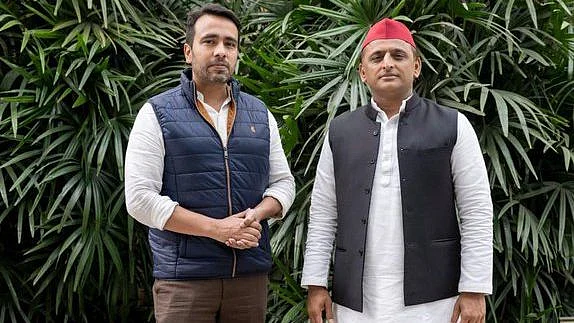The alliance between the Samajwadi Party (SP) and the Rashtriya Lok Dal (RLD) is almost finalised for the upcoming Assembly elections in Uttar Pradesh. On Tuesday, 23 November, the leaders of the two parties – SP president Akhilesh Yadav and RLD chief Jayant Chaudhary – met in Lucknow.
Soon after the meeting both the leaders tweeted pictures of the meeting. While Chaudhary gave the caption "Badhte Kadam" or "steps forward", Yadav wrote "Shri Jayant Chaudhary ke saath, badlav ki ore" (With Shri Jayant Chaudhary, towards political change).
The seat sharing arrangement between the two parties is likely to be announced soon. According to sources the RLD could contest 30-36 seats out of the 403 seats in UP. A handful of these seats could have SP candidates fighting on RLD tickets.
This alliance is significant for a number of reasons.
1. INCREASING BIPOLARITY
The SP-RLD alliance is another step towards what is becoming a more bipolar election than what UP has witnessed in the past three decades.
If this trend continues the pressure for anti-BJP voters who may have otherwise preferred parties like the BSP, Congress, AIMIM, Peace Party etc may feel compelled to consolidate behind the SP-led alliance.
For the past few decades, the top two parties in UP have polled around 50-55 percent of the votes. This could easily cross 70 percent if opinion polls are any indication.
While it's not clear if this would happen, an increased consolidation of Opposition votes is SP's main hope to close the gap with the BJP.
2. WEST UP AND THE FARMERS' PROTEST
Surveys have indicated that West UP, which is the RLD's main area of influence, has emerged as the biggest roadblock for the BJP. This is mainly due to the anger against the BJP following the farm laws.
Even though Prime Minister Narendra Modi has announced that the laws will be repealed, it remains to be seen if that helps the BJP contain damage in the area.
The farm unions and BJP's internal critics like Varun Gandhi and Satyapal Malik have already shifted the goalpost to an MSP guarantee, thereby keeping the issue alive.
Psephologist and C-Voter founder Yashwant Deshmukh had told The Quint that "the farm laws are only part of the problem. The Jats felt that they are not being heard in the present government".
If it wasn't just about the farm laws but a broader political disaffection, it is possible that the repeal may not lead to a major improvement in the BJP's fortunes among Jats at least.
With the RLD – the only Jat-dominated party in UP – now joining hands with the main Opposition SP, it is clear for Jats which formation is likely to give them the most importance
3. RLD'S BASE AND A POSSIBLE SOCIAL ALLIANCE
The RLD's base among Jats had been shrinking due to the BJP's rise following the 2013 Muzaffarnagar violence. However, it has begun improving since the farmers' protest began.
Jayant Chaudhary has been one of the politicians most actively supporting the farmers' movement.
Chaudhary is of the firm belief that RLD's agrarian politics is the antidote to the communal polarisation that has come with the BJP's rise in West UP.
Even at its weak period, in the 2017 Assembly polls, the RLD secured over 10 percent votes in as many as 22 seats. It managed to win only one seat though — Chhaprauli. The remaining 21 seats where RLD secured over 10 percent votes are: Thana Bhawan, Shamli, Meerapur, Moradabad Rural, Siwalkhas, Baraut, Baghpat, Loni, Modi Nagar, Khair, Iglas, Sadabad, Mant, Goverdhan, Mathura, Baldev, Fatehpur Sikri, Barkhera, Bachhrawan, Isauli, and Jahanabad.
It is likely that many of these 22 seats could fall under the RLD's quota in the elections.
The alliance also opens up the space for the revival of a social alliance between Jat, Muslim, and Yadav voters in UP. Though there aren't many seats where both Jats and Yadavs are in sizable numbers, a Jat + Muslim and Yadav + Muslim consolidation in certain seats could be formidable and act as a base for attracting more anti-BJP votes from other communities.
If Jats and Muslims come together, that would itself be a significant development as there had been a wedge between the two communities since the 2013 Muzaffarnagar violence.
4. IDEOLOGICAL AND FAMILIAL CONNECTION
The SP and RLD share a close ideological compatibility. Chaudhary Charan Singh is said to have been the mentor of SP founder Mulayam Singh Yadav, who learnt a great deal from the former. In the 1970s Chaudhary Charan Singh forged a coalition of intermediary castes like Jats and Yadavs and brought them together to break the Congress' hold in Uttar Pradesh.
Though coming from West UP and the Doab area respectively, both Charan Singh and Mulayam Singh Yadav paid a lot of attention to mobilising the agrarian castes of Eastern Uttar Pradesh as well.
The duo of Akhilesh Yadav and Jayant Chaudhary will now have a similar challenge — to spread the advantage of the farmers' mobilisation in West UP and Tera to central and East UP and Bundelkhand.
Like Charan Singh and Mulayam Singh Yadav – who were steadfast opponents of Indira Gandhi – Akhilesh Yadav and Jayant Chaudhary are also up against powerful leaders with a strong desire to concentrate power — Prime Minister Narendra Modi and UP CM Yogi Adityanath.
Tuesday's meeting between the two and the public show of bonhomie puts paid to rumours that the RLD could possibly strike a deal with the Congress or go it alone.
